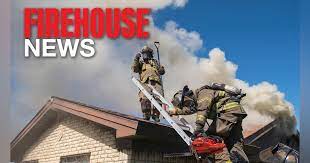March 26, 2023 Items of Norman firefighters who retired due to mental health issues were displayed on ‘Wall of Shame’ at a fire station.
By Mindy Ragan Wood Source The Norman Transcript, Okla. (TNS) Distributed by Tribune Content Agency, LLC.
Mar. 26—Inside the Norman Fire Department, a cycle of mental health disorders is fueled by trauma and a macho male culture that could be on its way out as young firefighters fight for the treatment they need to survive the job.
Over several months, The Transcript has conducted more than a dozen interviews with firefighters who remain employed and those who say they were forced to take mental health-related early retirements.
The Transcript granted anonymity at the request of firefighters, but obtained documents, photos and other evidence for this story.
On any given day, firefighters come into contact with horrific deaths due to accidents, fires, suicide, murder, medical causes like overdose deaths and heart conditions — but its the deaths of children that stay on their minds and tug at their hearts the longest, firefighters said.
These first responders who see children the same ages as their own and witness the crushing grief of those who love them strikes in the hearts of these firefighters a quiet terror of losing their own.
“You know,” said one firefighter, “you go out on these calls and you come back and wash the blood off your boots. The memories don’t wash off so easily.”
Bathed in the blood of children, smeared with exploded, charred bodies, and haunted by survivors’ grief, firefighters shared with The Transcript nightmares, flashbacks, depression, anger and addiction as signs of post traumatic disorder.
One firefighter said he contemplated suicide.
“I wanted to die,” he said. “I didn’t care anymore. The choice I had to make, I honestly felt, it was either leave or I’m dead.”
Wall of shame
Despite clear evidence they needed help, firefighters told The Transcript it took months to work up the courage to ask for it because of a “macho culture.”
When firefighters decided to confide in a department peer, they said news of their problems became common knowledge, which led to a lack of respect among coworkers.
They pointed to what became known as “The Wall of Shame” at Fire Station 1, 411 E. Main St. T-shirts and other items belonging to those who retired on mental health or other claims hanged haphazardly on one wall, while nearby those who completed full retirement were featured neatly on another wall, their names typed on metal plates in the same station.
The wall emerged sometime in the later part of 2019, but a memo from Fire Chief Travis King ordered its removal. The city, in a statement dated March 15, said those responsible for the wall were disciplined. Union officials, however, told The Transcript last week that no notice or evidence of discipline had reached its office — a normal practice.
News of the wall reached Norman police Lt. Teddy Wilson. He heads up the police peer support team for officers and has consulted with traumatized firefighters.
“It’s a breach of their confidentiality,” Wilson said of the wall’s clear naming of firefighters. “They confided in some of their fellow firefighters and they were put on a wall of shame. It’s despicable.”
The Transcript attempted to reach King for this story, but did not hear back. Some questions intended for the fire chief were addressed by the city’s communications director. Other questions went unanswered.
Assistant City Attorney Rick Knighton told The Transcript the wall was misunderstood. He said it was meant to honor members of the department. But firefighters said the message was unmistakable following several who retired early because of PTSD and other injuries compared to the wall where fully retired peers are featured.
Firefighters told The Transcript, the wall was evidence of spiraling morale and a clear message to keep quiet.
Consequences of silence
Jeff Dill, a former Chicago area firefighter and founder of Firefighter Behavioral Health Alliance, is a licensed counselor who operates the nonprofit to study trauma and mental trends for firefighters. The alliance conducts mental health training.
Dill said the macho culture remains a pervasive presence as traumatic calls get worse and more frequent.
“There’s a lot of more anger out there, a lot more mass casualty events, more shootings and all sorts of things,” Dill said. “So, it’s really testing our brothers and sisters out there.”
Dill called the macho mentality “cultural brainwashing” and said ignoring mental health is costing people their lives.
“We validated about 1,840 fire and EMS (emergency medical services) suicides over the last 13 years,” Dill said. “But we estimate only 65% reporting.”
The subject of PTSD began to be studied in first responders in 2010 when Dill said he and others received pushback with claims the disorder is “a military issue.”
By 2015, the Alliance’s data was clear.
“They saw our data and said, ‘Hey we’re losing a lot of people here’ and realized they needed to get involved in this.”
Dill said the alliance has already validated 18 suicides in 2023.
Today, Dill said departments all over the nation are addressing the issue with resources and education but more has to be done.
“It starts in your academies,” he said. “Educational workshops, training family members, chaplains, counselors within the employee system and outside the department.”
Firefighters hope morale and a better understanding of PTSD emerges in the department soon.
“Morale is kind of a suit of armor, so to speak for defending yourself,” one said. “In high morale, there’s trust.”
